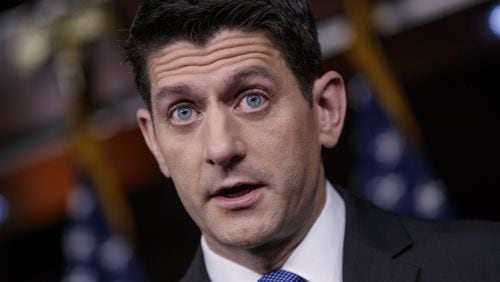Georgians with health insurance through the Affordable Care Act could get thousands of dollars less to help buy coverage under a new plan unveiled by the GOP this week.
The federal tax credits proposed in the House plan, the "American Health Care Act," would be far less generous for older and low-income Georgians, especially those in rural areas where insurance premiums are often significantly higher than in metro Atlanta, data compiled by the nonprofit Kaiser Family Foundation shows.
GUIDE: The Affordable Care Act in Georgia
IN-DEPTH: Georgians with Obamacare in the dark
At the same time, more Georgians with higher incomes — including individuals making up to $75,000 a year — could qualify for tax credits to buy health coverage through the Obamacare insurance exchanges. Under existing law, people who make more than roughly $48,000 don’t qualify for financial help.
The current system is not working, Health and Human Services Secretary Tom Price said during a White House press conference Tuesday afternoon. The former Georgia congressman pointed to insurance premiums that are increasing by double-digits for many Americans as well as out-of-pocket costs so high patients can’t afford to get the care they need.
“Sadly, the costs are going up for those folks … the access is going down, and it’s only getting worse,” Price said.
But critics argue the GOP plan favors the wealthy and would strip potentially millions of working-class Americans of the health care coverage they desperately need.
“It’s very likely that many Georgians who have coverage today will no longer be able to afford it under this plan and will lose coverage,” said Cindy Zeldin, executive director of Georgians for a Healthy Future, a consumer advocacy group. “It tilts the tax credits and the help with premiums towards higher-income Georgians, and away from lower income and moderate income Georgians” – those who make perhaps $30,000 to $40,000 a year.
‘Show us the numbers’
Currently, it's unclear how much the replacement plan would cost, how Republicans would pay for it and how many Americans would lose or gain health insurance under it. The Congressional Budget Office, which estimates the financial impact of bills, has not completed its predictions on how many people would keep or lose insurance under the latest plan.
Nearly half a million Georgians currently get Obamacare insurance — 85 percent of whom get tax credits to help afford that coverage.
The tax credit proposal is just one of a number of key provisions in the Republican health plan unveiled late Monday. It keeps some wildly popular elements of Obamacare intact, such as allowing parents to keep kids on their insurance until they turn 26, and eliminates others like the individual mandate that requires most Americans to buy health insurance or pay a penalty. It would also allow states to expand their Medicaid health programs for the poor through Jan. 1, 2020, after which enrollment would be frozen.
The ambitious plan is far from a done deal with GOP leaders facing opposition not just from Democrats but their own ranks as well. Some House Republicans have derided the plan as “Obamacare Lite,” saying it doesn’t go far enough to repeal Barack Obama’s signature health care law. GOP leaders have played down those divisions, saying they’re confident everyone will line up behind the plan once negotiations are complete.
Top Democrats railed against both the plan and against Republicans for moving ahead without cost estimates.
“Show us the numbers,” House Minority Leader Nancy Pelosi said on CBS, warning that millions would lose coverage under the plan.
But Republican advocates said the important thing was to press forward.
“The responsible move is to rescue health care. That’s what we’re trying to do,” U.S. Rep. Buddy Carter, R-Pooler, said Tuesday. “I can’t operate on what I don’t know. I can operate on what I do know, and I do know that Obamacare is failing miserably … Time is of the essence here.”
Tax credits ‘don’t go nearly as far?’
The Affordable Care Act and the GOP proposal both offer tax credits to help people buy insurance but structure them very differently. Right now, Obamacare tax credits are based on income, with people who make less getting more help. The GOP plan, however, would give people a lump-sum credit based mostly on age and less on income.
Here’s an example of how that might look in Georgia based on Kaiser’s analysis.
In Fulton County, a 27-year-old making $30,000 a year would see his tax credit under the new plan nearly double from $680 to $2,000. However, a 60-year-old making the same amount in the same county would see his credit decrease by nearly one-third from $5,710 to $4,000.
At the same time, the GOP plan would also allow insurers to charge older people - who have more expensive health needs - higher premiums than they can now.
The tax credits under the proposed Obamacare replacement bill in many cases won’t make up for increasing premiums, which means many people may no longer be able to afford coverage, said Gary Claxton, a health care expert at Kaiser.
The credits “don’t go nearly as far” as under Obamacare, Claxton said. Areas of rural Georgia, which have some of the highest Obamacare premiums in the nation and poorest residents, would feel the biggest hit.
For instance, a 60-year-old in southwest Georgia's Calhoun County making $20,000 a year would see her tax credit under the new plan drop by more than $10,000 to just $4,000. A person the same age, making the same amount and living in DeKalb County would see a decrease of just over $3,000.
What comes next?
A pair of House committees is scheduled to take up the legislation, comprised in two bills, on Wednesday. GOP leaders are looking to advance it by Easter.
After a full day of consideration, Georgia state leaders were still too wary to take a stance.
Georgia House Speaker David Ralston and Lt. Gov. Casey Cagle had no comment. Gov. Nathan Deal “is reviewing the proposal and engaging with federal and state officials to assess its impact on Georgia,” said his spokeswoman, Jen Talaber Ryan.
Georgia citizens too were just finding their way. Conservative Ted Souris, who himself has Obamacare insurance, said repeal of the individual mandate was "excellent" but the rest of the provisions were Republicans trying to "soften the blow" when they really needed to get the government out of health care.
Small business owner Alex Dang, a nail salon owner who employs 10, who has diabetes and also relies on Obamacare, couldn’t disagree more. “I don’t know what type of plan they’re going to come out with to help middle-aged people like me with conditions,” Dang said. “I’m going to be the one suffering the most.”








